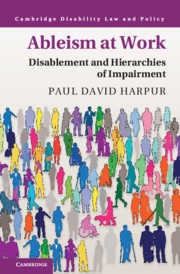Book contents
- Ableism at Work
- Cambridge Disability Law and Policy Series
- Ableism at Work
- Copyright page
- Contents
- Foreword
- Acknowledgements
- 1 Introduction
- 2 International Disability Norms at Work
- 3 The CRPD Committee, Ableism and Hierarchies of Impairment at Work
- 4 Hierarchies of Impairment at Work in the Regulation and Response to Sheltered Work
- 5 The Arbitrary Exclusion of Episodic and Psychosocial Disabilities from Legal Protection
- 6 Ability Apartheid at Work
- 7 Reasonable Accommodations in a Psychosocial Diverse Workplace
- 8 Using Occupational Safety and Health Laws to Promote Psychological Health at Work
- 9 Sanism and Ableism in the Law’s Response to Injured Workers
- 10 Advancing Psychosocial Diversity Using Contract and Unfair Dismissal Laws
- Index
10 - Advancing Psychosocial Diversity Using Contract and Unfair Dismissal Laws
Published online by Cambridge University Press: 06 August 2020
- Ableism at Work
- Cambridge Disability Law and Policy Series
- Ableism at Work
- Copyright page
- Contents
- Foreword
- Acknowledgements
- 1 Introduction
- 2 International Disability Norms at Work
- 3 The CRPD Committee, Ableism and Hierarchies of Impairment at Work
- 4 Hierarchies of Impairment at Work in the Regulation and Response to Sheltered Work
- 5 The Arbitrary Exclusion of Episodic and Psychosocial Disabilities from Legal Protection
- 6 Ability Apartheid at Work
- 7 Reasonable Accommodations in a Psychosocial Diverse Workplace
- 8 Using Occupational Safety and Health Laws to Promote Psychological Health at Work
- 9 Sanism and Ableism in the Law’s Response to Injured Workers
- 10 Advancing Psychosocial Diversity Using Contract and Unfair Dismissal Laws
- Index
Summary
This chapter moves away from identifying regulatory gaps and proposing reforms, and instead analyses how existing laws could provide an imperfect remedy for those who are not protected by anti-discrimination laws. Unfair dismissal options protect all workers against certain forms of dismissal.[1] This remedy seeks to address unfair contractual treatment and not discriminatory treatment. A positive element of these provisions is that there is no need to prove disability, or come out with a disability if it is invisible. This is a huge benefit for those who have a range of abilities which may not qualify as a disability under anti-discrimination laws, or who may desire not to identify as having a disability to themselves, their families or their employers.
- Type
- Chapter
- Information
- Ableism at WorkDisablement and Hierarchies of Impairment, pp. 207 - 226Publisher: Cambridge University PressPrint publication year: 2019

